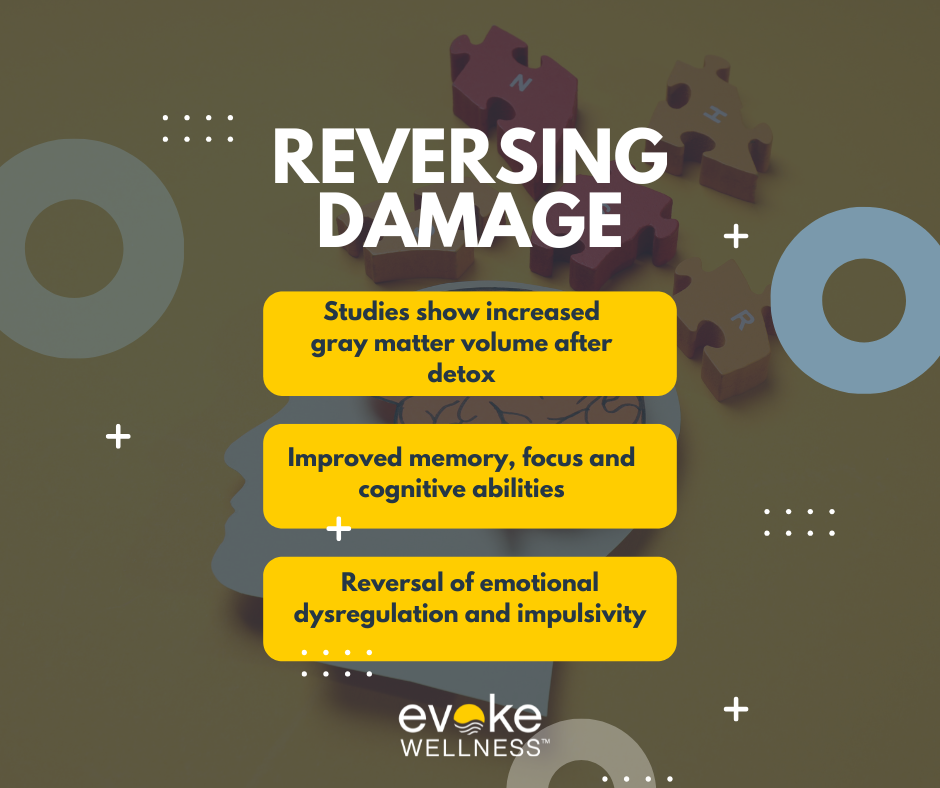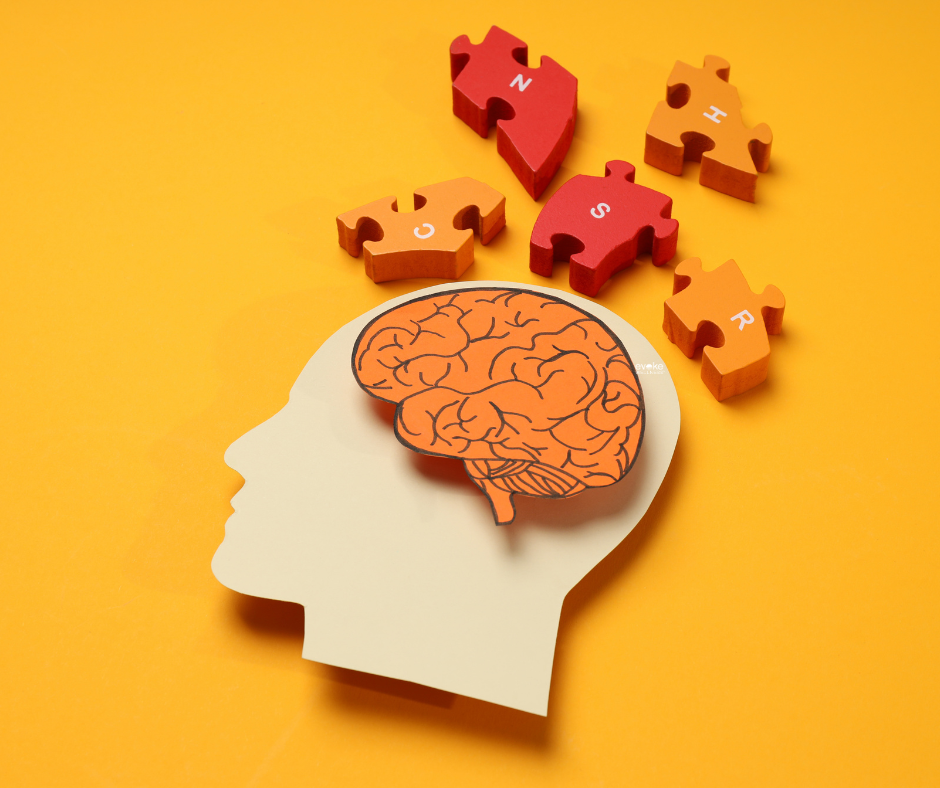When you struggle with substance abuse, your brain undergoes significant changes that impact your health and well-being. Fortunately, detoxification can play a crucial role in reversing these alterations and supporting brain recovery. Recent studies show that proper detox protocols can lead to a 40% improvement in cognitive function within just 90 days. At Evoke Wellness at Hilliard, we offer comprehensive detox programs designed to help you reclaim your brain health and overall wellness. From medical detox for acute withdrawal to residential treatment and specialized therapy programs, our evidence-based approach addresses the complex needs of individuals seeking lasting recovery. Discover how our detox support can be the first step toward a healthier brain and a brighter future.
Together, let’s embrace the journey to recovery and the promise of a new beginning. Call us at (833) 949-1347 today or reach out online.
How Detoxification Helps Reverse Substance-Induced Brain Changes
Prolonged substance abuse profoundly impacts the brain’s structure and function. However, detoxification initiates a healing process that can help reverse these damaging changes over time.
Restoring Neurotransmitter Balance
During active addiction, drugs hijack the brain’s neurotransmitter systems responsible for pleasure, motivation, and self-control. Detox allows these disrupted chemical messengers to gradually return to healthier levels, diminishing cravings and compulsive drug-seeking behaviors.
- According to a 2019 study, abstinence from methamphetamine normalizes dopamine transporter levels after 14 months.
- A 2020 review links successful detox from opioids to restored endorphin and enkephalin production.
Reversing Brain Region Impairment
Substance abuse causes physical changes in brain areas governing judgment, decision-making, learning, memory, and behavioral control. With sustained sobriety facilitated by detox and treatment, many of these regions can regain lost gray matter volume and white matter integrity.
- MRI studies show increases in prefrontal cortex volume within 6-12 months after alcohol detox.
- One longitudinal study found recovering cocaine users regained age-appropriate levels of frontal lobe metabolism after 5 years of abstinence.
Promoting Neuroplasticity
Detox allows the brain to heal by harnessing its neuroplasticity – the ability to create new neural pathways and synaptic connections throughout life. Therapeutic activities during and after detox help reinforce positive thought patterns and behaviors.
- Mindfulness practices, counseling, and learning new skills all stimulate neurogenesis and neural rewiring.
- Exercise during recovery helps generate new brain cells in the hippocampus, boosting memory and mood.
By cleansing the body of substances and stabilizing brain chemistry, detox sets the stage for the brain’s remarkable capacity to recover from addiction’s ravages.
Understanding the Glymphatic System’s Role in Brain Detox
The glymphatic system acts as the brain’s unique waste clearance system. It utilizes cerebral spinal fluid (CSF) to flush out toxins and metabolic waste products that accumulate during normal neural activity.
Glymphatic Pathway
- CSF enters the brain along para-arterial pathways
- It diffuses through the interstitial space, collecting proteins and other cellular debris
- The waste-filled CSF is drained out via para-venous pathways back into the venous circulatory system
Role in Detoxification
Poor glymphatic function can allow toxins like alcohol, drugs, and neuroinflammatory molecules to accumulate in brain tissue. This buildup disrupts neural communication and may contribute to mental fog, cognitive deficits, and neurodegeneration over time.
Detoxification helps restore optimal glymphatic flow. During medical detox, substances are cleared from the body while IV fluids, medications, and therapies support this cleansing process. As the brain gradually rids itself of accumulated toxins, cognitive abilities can begin recovering.
Boosting the Glymphatic System
Recent research shows the glymphatic system is most active during sleep. Getting quality sleep, staying hydrated, exercising, and reducing stress all promote robust waste clearance from the brain. Prioritizing these lifestyle factors during and after detox maximizes the benefits of this critical detoxification pathway.
What Is a Brain Detox and How It Works
The Need for Detox
Chronic substance abuse can significantly alter brain chemistry and function. As substances are repeatedly introduced, the brain adapts by adjusting neurotransmitter levels and receptor sensitivities. This leads to dependence, tolerance, and impaired cognitive abilities.
Restoring Balance
A brain detox aims to restore the brain’s delicate neurochemical balance disrupted by substance use. It involves:
- Safely eliminating substances from the body through medical detox
- Allowing the brain to gradually re-establish healthy neurotransmitter levels
- Reversing substance-induced changes through therapy and lifestyle adjustments
The Process
During acute detox, withdrawal symptoms emerge as the brain struggles to regain equilibrium. Medications can help manage these symptoms. Residential treatment then provides:
- Comprehensive support for sustained abstinence
- Counseling to develop coping mechanisms
- Holistic therapies like meditation to promote neurogenesis
Long-Term Healing
While acute detox takes days to weeks, full brain recovery is a gradual process spanning months to years. Continued therapy equips individuals with tools to maintain sobriety and rebuild cognitive abilities impaired by past substance use.
The Benefits of Medical Detox for the Brain
Reversing Damage
Substance abuse can significantly impair brain function and structure over time. However, through proper medical detox and therapy, many of these changes are reversible. Detox allows the brain to begin healing by removing toxins and restoring chemical balances.

Professional Support
Medical detox offers comprehensive support to manage withdrawal symptoms safely and comfortably. Around-the-clock monitoring ensures proper hydration, nutrition and medication as needed.
- Prevents life-threatening complications like delirium tremens
- Reduces risk of relapse during acute withdrawal
- Paves the way for successful long-term recovery
Neurological Healing
As the brain rids itself of substances, neural pathways begin repairing. This allows for restoration of balanced neurotransmission and healthy brain patterns over time.
- Increased dopamine receptor availability
- Normalization of glutamate levels for neuroprotection
- New neural connections form as the brain rebounds
The medical detox process gives the brain its best chance to heal from substance-induced changes. With comprehensive care, improved cognitive function, emotional regulation and overall well-being become attainable goals.
Residential Treatment Programs Support Brain Health
Immersive residential treatment programs provide a dedicated environment to support long-term brain health during addiction recovery. When you enter a residential program, you gain access to:
A Trigger-Free Setting
Removing yourself from everyday stressors allows you to focus solely on your recovery. This distraction-free setting enables you to address root issues fueling substance abuse.
Evidence-Based Therapies
Cognitive-behavioral therapy (CBT), dialectical behavior therapy (DBT), and other evidence-based modalities equip you with tools to manage cravings, deal with triggers, and prevent relapse – all crucial for sustained brain health.
Dual Diagnosis Treatment
Many struggle with co-occurring mental health disorders like depression or anxiety. Integrated treatment programs address both conditions simultaneously, promoting better outcomes.
Medication-Assisted Therapy
Options like methadone and Vivitrol can minimize withdrawal symptoms and cravings, allowing you to concentrate on recovery and long-term sobriety.
Peer & Professional Support
Surrounding yourself with others on the recovery journey, along with 24/7 professional care, creates a strong support system vital for lasting brain health.
By removing environmental triggers and providing comprehensive, personalized care, residential programs lay the foundation for reversing substance-induced brain changes and achieving full recovery.
Integrating Therapy for Lasting Recovery
Detoxification is just the beginning of a comprehensive journey toward recovery. To ensure lasting sobriety, it’s crucial to address the underlying emotional and psychological factors that contribute to addiction. This is where integrative therapy programs play a vital role, providing a well-rounded approach to heal the mind, body, and spirit.
Trauma-Focused Therapies
Unresolved trauma can be a significant driving force behind substance abuse. Therapies like Eye Movement Desensitization and Reprocessing (EMDR) and psychodrama offer a safe space to confront and process traumatic experiences, reducing the risk of relapse and promoting long-term emotional healing.
Dialectical Behavior Therapy (DBT)
DBT is a powerful tool for addiction recovery, teaching mindfulness, distress tolerance, emotion regulation, and interpersonal effectiveness skills. By developing healthier coping mechanisms, individuals can navigate the challenges of early recovery, such as the “pink cloud” phase, without succumbing to substance use.
Cognitive-Behavioral Therapies
Cognitive-behavioral therapies like Acceptance and Commitment Therapy (ACT) help individuals cultivate psychological flexibility, identify core values, and commit to actions that align with their recovery goals. When combined with other evidence-based approaches, such as Cognitive Behavioral Therapy (CBT), these therapies provide a comprehensive toolkit for lasting sobriety.
By integrating a range of therapeutic modalities, individuals can address the complex interplay of factors contributing to addiction, fostering a holistic recovery that extends beyond physical detoxification. With the guidance of experienced professionals and a supportive community, the journey toward a healthier, substance-free life becomes more achievable and sustainable.
How Long Does It Take to Detox Your Brain?
The Withdrawal Timeline
Detoxing from substances like alcohol, opioids, or cocaine is a crucial first step in recovery, but it’s also a challenging process that affects the brain. The timeline for detoxing your brain can vary depending on the substance, the severity of use, and individual factors. Generally speaking:
- The acute withdrawal phase begins within hours or days after the last use, bringing intense cravings, mood swings, anxiety, and physical symptoms that can last 1-3 weeks. This stage requires close medical monitoring to manage potentially dangerous symptoms.
- After acute withdrawal, the brain’s neurotransmitter levels and neural pathways disrupted by substance abuse take time to rebalance. Known as post-acute withdrawal syndrome (PAWS), lingering psychological effects like depression, anhedonia, and cravings can persist for weeks or months. Comprehensive treatment is crucial during this period.
Supporting Long-Term Recovery
While the physical detox process may be complete within a month for some, full brain recovery can take a year or more. That’s why inpatient rehab programs, therapy, and ongoing aftercare are so important:
- Residential treatment provides a substance-free environment and intensive therapies like CBT and DBT to rewire the brain’s reward pathways and develop healthier coping mechanisms.
- Group counseling and 12-step programs build a supportive community and accountability system.
- Medication-assisted treatments like Vivitrol can help reduce cravings during early recovery.
- Holistic approaches like meditation, exercise, and nutritional therapy promote overall well-being and brain health.
The brain’s incredible neuroplasticity means it can recover from addiction with comprehensive, long-term treatment tailored to the individual. While detox is just the first step, it paves the way for profound healing and positive rewiring of the brain.
Conclusion
In conclusion, detoxification plays a crucial role in reversing substance-induced changes and supporting a healthier brain. Through medical detox, acute detox, residential treatment, and therapy programs, you can begin the journey toward recovery and improved cognitive function. Recent studies show that up to 90% of individuals who complete a medically supervised detox program successfully transition to further treatment. By addressing both the physical and psychological aspects of addiction, you give your brain the best chance to heal and rewire itself. Remember, detox is just the first step – ongoing support and therapy are essential for long-term success. Take the courageous first step toward a healthier brain and a brighter future by seeking professional help for detoxification and comprehensive addiction treatment.
Begin Your Journey with Evoke Wellness at Hilliard
If you or a loved one is considering treatment, Evoke Wellness at Hilliard invites you to contact us. Our compassionate team is ready to answer your questions, discuss your needs, and help you take the first steps toward recovery. In Hilliard, you’ll find more than just a treatment program – you’ll discover a community dedicated to your wellness and success. Together, let’s embrace the journey to recovery and the promise of a new beginning. Call us at (833) 949-1347 today or reach out online.



